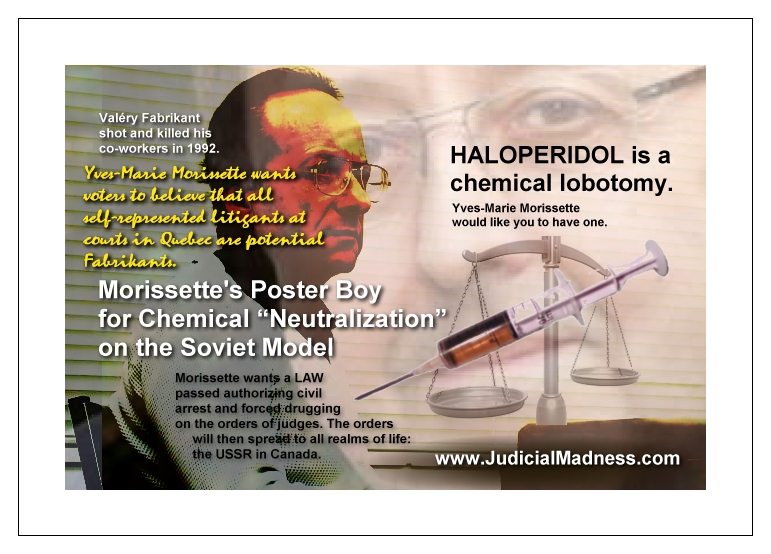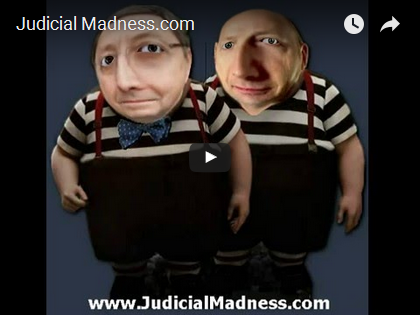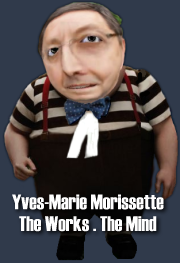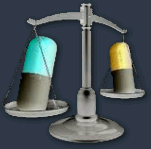Treatment-induced Suicide: Suicidality as a potential effect of psychiatric drugs
Treatment-induced Suicide: Suicidality as a potential effect of psychiatric drugs
Peter Lehmann
Psychiatric treatment, particularly drug treatment, is a factor in causing depression. This paper examines probable links between psychiatric treatment and suicide.
Depression can have many causes: psychosocial and political conditions, neurological diseases, metabolic disorders, aging, toxic substances and drugs. Psychiatrists generally focus on organic or supposed organic depressions, for which they prescribe psychiatric drugs and electroshocks. It is hard for them to accept that a large number of psychiatric drugs can cause or increase depression and suicidality. But in medical and pharmacological specialist literature there are many reports about the depressive effects of psychiatric drugs. In particular neuroleptics (so-called antipsychotic drugs) often initiate depression and suicide. A suicide-register with special consideration of associated psychiatric drugs, electroshocks, restraint and other forms of psychiatric coercion could be effective as a form of prevention and lower the incidence of depression and suicides.
Drug-associated depression and suicidality
Frank Ayd (1975) from the Psychiatric Department of the Franklin Square Hospital in Baltimore, USA, wrote:
There is now general agreement that mild to severe depressions that may lead to suicide may happen during treatment with any depot neuroleptic, just as they may occur during treatment with any oral neuroleptic. These depressive mood changes may transpire at any time during depot neuroleptic therapy. Some clinicians have noted depressions shortly after the initiation of treatment; others have observed this months or years after treatment was started. (p.497)
Otto Benkert and Harms Hippius (1980), two German psychiatrists, answered the question as to whether suicidality could possibly be caused by an excessive dosage:
Depression, suicidality, states of excitement and delirium under the influence of drugs generally occur during doses prescribed by the treating physician. (p.258)
Spring 2002 Lehmann 55
Empirical data about suicides caused by psychiatric drugs are hard to find for many reasons, as psychiatrists themselves acknowledge. Psychiatrists do not regard treatment as the cause of depression (Lehmann, 1996). Asmus Finzen of the Psychiatric Department of the University Berne, Switzerland, showed that the likely number of suicides in psychiatric institutions is vast, too; correct figures are, however, hard to find because
…in medical notes and discharge summaries you could often find no notification of the patients’ suicide or death. If the suicide happened during a vacation, the patient’s discharge might be backdated. If the suicide attempt did not lead to an immediate death, in the medical record and hospital statistics he would be considered as having been discharged and under the care of medical ward or emergency clinic. (1988, p.45)
In his placebo-controlled study, psychiatrist Peter Mueller from the Psychiatric Department of the University of Goettingen, Germany, found that a much higher percentage of people treated with psychiatric drugs had depressive symptoms than people treated with placebos. In relation to lessening or withdrawal of the psychiatric drugs he wrote:
Out of 47 cases the depressive mood lifted in 41 cases, in only two cases there was no change, and in four cases the effect was doubtful. It was very surprising to see that in the predominant number of cases the reduction of the doses (normally to half of the former dose) alone lead to an improvement of the depressive symptoms. Often it was only a partial improvement, but even this brought clear relief to the patient. On the other hand, in other patients, or in the same ones whose situation improved only slightly when taking lower doses, complete withdrawal made them feel much better. Some patients reported that only now did they feel completely healthy again, as they had long before their depressions. The depressive symptoms, which were seen to be unchangeable by some psychiatrists, and which could possibly have been taken to be a start of organic disorder, vanished completely. The possible argument that these could be psycho-reactive effects caused by the patients’ relief about the withdrawal of the psychiatric drug is refutable, because nearly all patients received depot-injections and were not informed about their doses or got placebo-injections. (…) Their change was quite impressive to themselves, their relatives and their medical examiners in some cases. The patients reported that now they felt completely healthy again. In the group of people still treated with psychiatric drugs, this was mostly not the case. These results quite definitely speak for pharmacogenic influences and against psychiatric morbidity developments. (Mueller, 1981)
Mueller resumed:
Depressive syndromes after the remission of tlie psychoses and under treatment with psychiatric drugs are not rare, but occur in about two thirds of patients, and sometimes
56 The Journal of Critical Psychology, Counselling and Psychotherapy
even more frequently, especially when depot-drugs are given. Without treatment with psychiatric drugs, depressive syndromes after a complete remission are only found in exceptional cases, (p.72)
Mueller’s reports are supported by many of his colleagues (Lehmann, 1996). Raymond Battegay and Annemarie Gehring (1968) of the Psychiatric Department of the University of Basel, Switzerland warned, after a comparison of treatment courses before and after the era of psychiatric drugs:
During the last years, a shifting of the schizophrenic syndromes to a depressive syndrome was repeatedly described. More and more schizophrenias show a depressive-apathetic course. It became clear that often exactly that develops under psychiatric drugs, what should be avoided with their help and what is called a defect, (p. 107ff)
Poeldinger and Siebern of the Psychiatric Institution Wil, Switzerland, wrote:
It is not unusual that depressions caused by medication are marked by a frequent occurrence of suicidal ideation. (1983, p.131)
In 1976 Hans-Joachim Haase of the Psychiatric institution Landeck, Germany, reported that the number of perilous depressive occurrences after a treatment with psychiatric drugs increased at least ten times when compared with before the introduction of psychiatric drugs. The increase in the suicide rate is ‘alarming and worrying’, said Baerbel Armbruster of the Psychiatric Department of the University of Bonn, Germany, in 1986 in the Nervenarzt – without, nevertheless, alerting the (ex-) users and survivors of psychiatry and their relatives, or even the public.
Rolf Hessoe from the Psychiatric Department of the University of Oslo, Norway, reporting on developments in Finland, Sweden and Norway in 1977, noted that:
… the increased incidence of suicide, both absolutely and relatively, started in the year 1955. This was the year that neuroleptics were introduced in Scandinavian psychiatric hospitals. (p.122)
In 1982 Jiri Modestin wrote about his place of employment, the Psychiatric Department of the University of Berne, as well as the neighbouring psychiatric institution Muensingen:
Our results show a dramatic increase of suicide frequency among the patients in Berne and Muensingen in the last years. (p.258)
Atypical psychiatric drugs have suicidal effects, too, as the report of Austrian Ursula Froehlich in Brave New Psychiatry shows:
Spring 2002 Lehmann 57
Since I began taking Leponex (clozapine), I do not want sex anymore, do not feel like moving and have no joy in life. A life without joy is, however, worse than death. All that remains for me is watching TV, where I have watched others living for seven years. I am still alive biologically, but my senses are long since dead, everything that I formerly enjoyed I am not able to do anymore. In a way, my life does not exist anymore, I feel so empty and unimportant. In the mornings, the feeling is the worst. Every day I intend to start a healthy life the following day, to throw away the drugs, to drink many vitamins and fruit juices and to start with a daily fitness routine. The psychiatric drugs cause a feeling as if it was possible far me to start with a completely different, a new life the fallowing day. But when I wake up in the morning I feel smashed, and I never come out of bed before 9 o’clock, my depressions are so extreme that I think of suicide every day. (quoted from Lehmann, 1996, p.70ff)
Psychiatrists do not do [sic] differ in their own experiences of these drugs. In 1954 and 1955 Hans Heimann and Nikolaus Witt (1955) of the Psychiatric Department of the University of Berne published their experiences after taking Largactil, the prototype of chlorpromazine. They experimented with spiders and 1080 control subjects, they had three self-experiences and nine experiments with as many psychiatrists and pharmacologists. The marked feelings of inferiority and powerlessness, elements of the Parkinsonism caused by psychiatric drugs, are made clear in the following excerpts:
I felt physically and mentally ill. Suddenly my whole situation appeared hopeless and difficult. Above all the fact that one can be so miserable and exposed, so empty and superfluous, neither filled by wishes nor by something else, was torturing. … (After finishing the examinations): The tasks of life grew immense in front of me: dinner, go to the other building, come back – and all of that by foot. With that this state readied its maximum of uncomfortable emotions: The experience of a passive existence with clear knowledge of the other possibilities… (p.113)
Suicide-register as a form of prevention
In February 2000 the German Organisation of the (ex-) Users and Survivors of Psychiatry put forward the demand to the health minister to introduce a suicide-register with special consideration of associated psychiatric drugs, electroshocks and other forms of psychiatric compulsion. An obligation to notify the authorities of suicides associated with psychiatry and psychiatric drugs could enable preventive measures and instigate reliable studies that discover the connection between suicidality and the effects of psychiatric drugs. Not only neuroleptics, but antidepressants (Healy 2001; Lehmann 1996) and electroshock (Frank 1990), too, should be watched very attentively.
Reports of (ex-) users and survivors of psychiatry who have been pushed into suicide attempts after traumatizing treatment with psychiatric drugs, electro- and insulin shocks (see, for example, Kempker, 2000), must no longer been ignored. Physicians and relatives have to be informed about the risk of drug-caused
58 The Journal of Critical Psychology, Counselling and Psychotherapy
depression and suicidality – The users of psychiatry need to be informed so that they can make a carefully considered and informed decision about taking or not-taking an offered psychiatric drug and if necessary can take less risky measures against their depression.
References
Armbruster, B. (1986) Suizide während der stationären psychiatrischen behandlung. Nervenarzt 57, 511-516
Ayd, F. J. (1975) The depot fluphenazines. American Journal of Psychiatry, 132, 491-500
Battegay, R. and Gehring, A. (1968) Vergleichende Untersuchungen an schizophrenen der präneuroleptischen und der postneuroleptischen ära. Pharmakopsychiatrie Neuro-Psychophannakologie, 1, 107-122
Benkert, O. and Hippius, H. (1980) Psychiatrische Pharmakotherapie. 3. Berlin: Auflage
Finzen, A. (1988) Der Patientensuizid. Bonn
Frank, L. R. (1990) Electroshock: death, brain damage, memory loss and brainwashing. Journal of Mind and Behavior, 11, 489-502
Haase, H-J. (1976) Pharmakotherapie bei Schizophrenien. In Die behandlung der psychosen des schizophrenen und manisch-depressiven formenkreises. Stuttgart / New York
Healy, D. (2001) The SSRI Suicides. In C. Newnes, G. Holmes and C. Dunn (Eds.) This is Madness Too: Critical perspectives on mental health services. Ross-on-Wye: PCCS Books
Heimann, H. and Witt, P. N. (1955) Die Wirkung einer einmaligen Largactilgabe bei gesunden. Monatsscltrift für Psychiatrie und Neurologie, Band 129, 104-123
Hessoe, R. (1977) Suicide in Norwegian, Finnish, and Swedish hospitals. Archiv für Psychiatrie und Nervenkrankheiten, 224, 119-127
Kempker, K. (2000) Mitgift-Notizen vom Versdrwinden. Berlin
Lehmann, P. (19%) Schöne Neue Psychiatrie, Band 1: Wie chemie und ström auf geisl und psyche wirken. Berlin
Modestin, ]. (1982) Suizid in der psychiatrischen institution. Nervenarzt, 53, 254-261
Mueller, P. (1981) Depressive Syndrome im Verlauf Schizophrener Psychosen. Stuttgart
Poeldinger, W. and Siebem, S. (1983) Depression-inducing and antidepressive effects of neuroleptics, Neuropsychobiology, 10, 131-136
ENDNOTE: This paper was presented as a contribution to the conference Coping with stress and depression related problems in Europe, organized by the World Health Organization, the European Commission and the Federal Ministry of Social Affairs, Public Health and the Environment (Belgium), Brussels, October 25 - 27,2001




